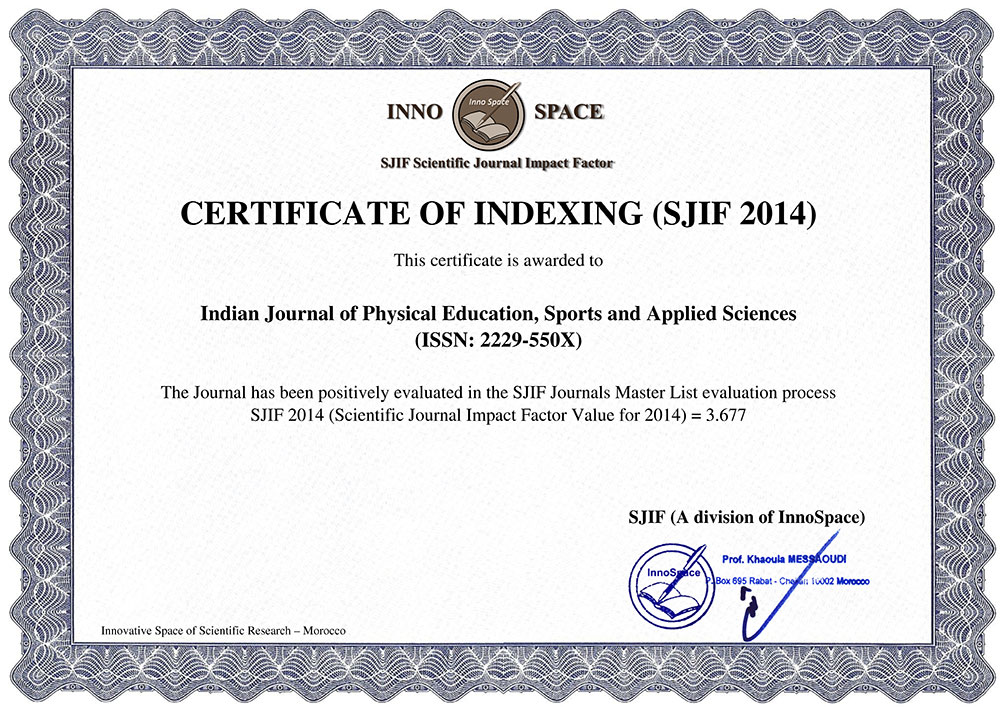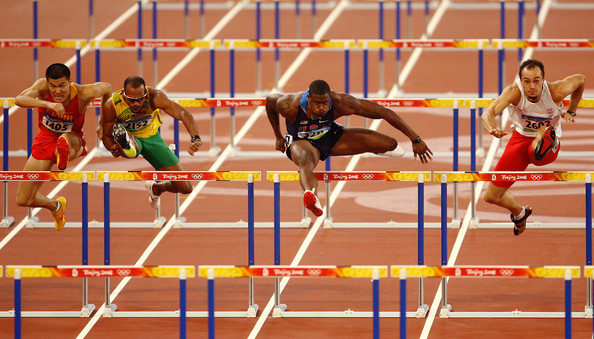EFFECT OF PARTICIPATION IN SPORTS ON FRUSTRATION TOLERANCE CAPACITY OF SECONDARY STUDENTS
Volume 7-Number 1, January, 2017 February 13, 2017| Author name : | Saleem Jaffer & Dr. Sudhir Rajpal | ||||
|---|---|---|---|---|---|
| Page no : | 38-41 | Volume : | 7 | Issue : | 1 |
doi no: 02.2017-65598867; DOI Link :: http://doi-ds.org/doilink/02.2017-65598867/
Saleem Jaffer1 Dr. Sudhir Rajpal2
Affiliations:
1 M.Phil. Student, Dr. C.V. Raman University, Kota Bilaspur C.G.
2Assistant Professor, Department of Physical Education, Dr. C.V. Raman University, Kota Bilaspur C.G.
ABSTRACT
The aim of the present study is to compare frustration tolerance capacity of secondary students on the basis of their participation in sports. 50 secondary student athletes (Ave. age 17.41 yrs) were selected from secondary schools of Bilaspur city. To fulfil the objectives of the present study, another set of 50 non player secondary students (Ave. age 16.92 yrs) were also selected. The criterion for selection of athletes was participation in district/state level tournaments in any sporting event. Random sampling method was used for selection of sample in the present study. To assess frustration tolerance capacity of selected secondary student athletes and non athletes, Reactions to frustration scale, prepared by Dixit and Shrivastava (2011) was the preferred choice. It consists in all 40 items which assess aggression, resignation, fixation and regression. The reliability of this test is 0.79. Lower the score superior is the frustration tolerance capacity of the subject is the direction of scoring. Results indicate that frustration tolerance capacity of secondary student athletes was far more superior as compared to secondary student non athletes. On the basis of results and associated discussion it was concluded that participation in competitive sports may be incorporated in curriculum so that secondary students frustration tolerance capacity can be enhanced
Keywords: Kabaddi Performance, Physical Fitness, Cardiovascular Endurance, Strength, Agility, Speed.
BIBLIOGRAPHY
Balbir, K. “To study frustration in relation to socio-metric status.” M.Ed. dissertation. Punjabi University, 1987.
Baldwin, A.L. “The effect of home environment on nursery school behavior.” Child development 20:2 (1949): 49-61
Chadha, M “Psycho-Social correlated of frustration among students of professional school.”, 2003.
Kaur, Manpreet “Study of Adolescence Problems in Relation to Frustration of Mansa District”. International Journal of Research in Humanities, Arts and Literature 2 :6 (2014): 103-122
Kashyap, V “Psychological determinants pf adolescent problems”. Ph.D. Edu. Agra Unviersity, Buch M.B. Fifth Survey of Research in Education Vol. II, NCERT, New Delhi 1989.
Moanco, Linda “Hope, Coping and Adjustment among family members of individuals with obsessive compulsive disorder.” Dissertation Abstract International, The Sciences and Engineering, 60:9-B (2000): 4898.
Moshim, S.M. “Effect of frustration on Problem Solving Behavior” Journal Abnormal Psychology. 49:1 (1954):152-155.
Mithal, S.L. “A study of frustration in adolescents and its relations with level of aspiration” Ph.D. Thesis, Agra University, 1975.
Nirmala, N. and Ahmad, S. “Comparative study to understand the different plane of Emotional Maturity among Sports and Non-sports Girls of a private college”. PARIPAX, 3 :4 (2014) :302-304.
Reddy, A.V.R. (1978). “Parental Education Status and Adjustment of Children” Psychological Studies 20 (1978) : 1-2.
Rathe, N. K. “Analysis of Self- Perception among Female College Students”. Journal of Exercise Science and Physiotherapy, 5:2 (2009) : 87-90.
Rosenweig, S. An outline of frustration theory. In Personality and Behaviour Disorders, New York. 1944.







